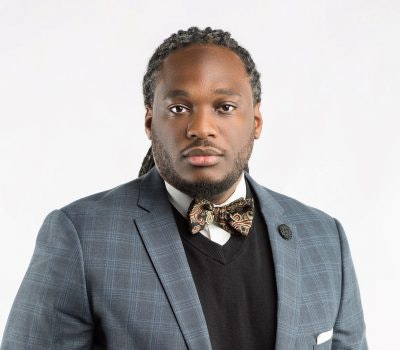Black professors struggle at White-led and operated institutions around the world. For instance, according to BBC, only 155 out of more than 23,000 university professors in the UK are Black. And according to the U.S. Department of Education’s National Center for Education Statistics, only 4 % of all full-time faculty are Black when they make up nearly 14% of the US population. Not only that, but Blacks are also often portrayed as minimally existing or as token sidekicks in futuristic comics or movies.
So, it is necessary for Black faculty to reshape the narrative. Yes, we do get excited about depictions of us as scientists in movies like the Black Panther and like Octavia Spencer in the new Netflix film, Thunder Force. But what would it be like to envision ourselves as faculty in the future? What would the future of the Black professoriate look like in the year 2050, 2075, or the year 3000?
 Dr. Sydney Freeman Jr.
Dr. Sydney Freeman Jr.In this essay, I will envision what it would look like to have Black faculty have transformational experiences that would lead to them thriving holistically – mentally, spiritually, socially, and physically. I would like to introduce my Model of Black Transformation, a 5-step approach to help us think about Black professors in the future. The steps that I propose in my model are: 1) Decolonization, 2) Abolition, 3) Revolution, 4) Liberation, and 5) Sovereignty.
The first step that I envision Black faculty in the future taking to transform their experiences in higher education is decolonizing their minds. I define Decolonization as the holistic process of letting go of colonial practices, values, and culture. Adopting and returning to indigenous ways of knowing and being. In other words, a change of mindset centering African ways of thinking and living.
White institutions’ ice water is no wetter or colder than that of Historically Black Colleges & Universities. Engaging in research that has a direct impact on Black people has no less value than engaging in scholarship that incorporates other racial groups. Decolonizing our minds, says that charity starts at home and if we have a chance to get a Fulbright scholarship to engage in study overseas. To the extent that it makes sense, and it relates to our scholarship, we will prioritize opportunities in Africa, South America, and the Caribbean. And as we become senior scholars we mentor and go to bat for our junior colleagues, post-docs, staff and students.
The second step is Abolition. I define Abolition as being willing to fight injustice and dismantle practices, systems, institutions, or power structures. Not only will faculty support their Black colleagues, but they will use their positions to change policies that are inherently anti-Black. They will engage in research that is applied that can impact local Black communities but also partner with our Black colleagues across the diaspora to address entrenched challenges facing our communities around the globe. They will teach using both culturally sensitive pedagogy and critical Black pedagogy, decentering traditional Western-centered approaches to instruction.
The third step is Revolution. I define revolution as a fundamental change from the status quo that facilitates new ways of knowing, being, and operating. Black faculty will embrace the radical revolution of Rest. Rest will be a primary form of resistance. They will center the care of themselves, their family, and community ahead of institutions that do not love them. And they will leave institutions that do not serve them.
The fourth step is Liberation. To be liberated is to be free from forms of spiritual, psychological, and physical oppression and captivity. Black faculty in the future will be free not only to engage in scholarship that has immediate impact but is esoteric. By that I mean that it may be research that is understood by a few people or does not necessarily solve a pressing problem. But Black faculty in the future will have the freedom to dream. And these faculty members will be willing to stand up to leaders, Black or White, faculty or administrators, state legislators or board of trustees. And these Black faculty members understand that they are not free until we all are free.
The last step is Sovereignty. When I say sovereignty, I am stating that Black faculty will be committed to supporting and/or establishing Black-owned and operated higher education institutions. Of course, I am advocating for the support of Historically Black Colleges & Universities and Predominantly Black Institutions with their time, treasures, and talents. But I am also suggesting that Black faculty will ensure that Black spaces are carved out at White institutions.
I will close out with this example. Earlier this year, I was notified that along with being allocated dedicated space to reestablish the Black Cultural Center on my university’s campus, we had gotten the go-ahead to hire a director to lead the center. These were two initiatives that I conceptualized and led. After hearing the news, I went on a walk. As I was walking, it was like I heard a voice say, “hush harbor”. I had heard of the term before but did not know what it meant. So, right there I stopped and googled what it was. And I found out that hush harbors were hidden places, sacred spaces, holy places where our enslaved fore-parents gathered and used coded language or songs to strategize for their freedom. I believe that Black faculty at White institutions should use their influence to create and/or strengthen existing “hush harbors” on these campuses such as Black cultural centers and Black studies programs that are dedicated to the advancement of our people. With the ultimate goal of ensuring every Black person in the academy has the space and the ability to thrive.
So, the future of Black scholars in higher education is transformation. And by following the steps of Decolonization, Abolition, Revolution, Liberation, and Sovereignty, Black faculty in the future will be Transformed.
Dr. Sydney Freeman Jr. is a tenured professor of adult, organizational learning, and leadership at the University of Idaho. His research interests include the college and university presidency, faculty development, faculty careers, and higher education as a field of study.















